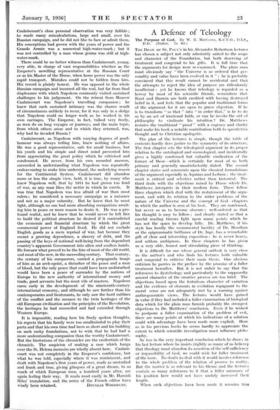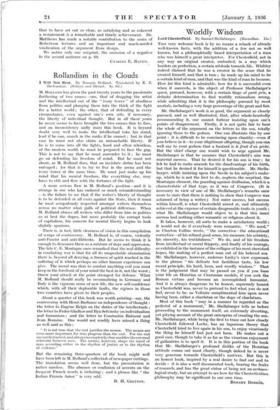A Defence of Teleology
The Purpose of God. By W. R. Matt!iews, K.C.V.O., D.Lit., D.D. (Nisbet. 7s. 6d.)
THE DEAN OF ST. Palm's in his Alexander Robertson lectures has chosen a subject not only admirably suited to the scope
and character of the Foundation, but both deserving of treatment and congenial to his gifts. It is full time that the arguments for design were re-examined. The plain man must obviously say " the Universe is so ordered that per- sonality and value have been evolved in it " : he is prolmbly convinced that this result cannot be accidental and that the attempts to reject the idea of purpose are ridiculously insufficient : yet he knows that teleology is regarded as a heresy by most of his scientific friends, remembers that Kant and Darwin are both credited with having destroyed belief in it, and feels that the popular and traditional forms of the argument for it arc open to grave objection. If he is to transform "so that" into "in order that," is he to do so by an act of irrational faith, or can he invoke the aid of philosophy to vindicate his intuition ? Dr. Matthews restates the traditional " proof " with a cogency and clarity that make his book a notable contribution both to speculative thought and to Christian apologetic.
The plan of the lectures is simple, though the table of contents hardly does justice to the symmetry of its structure. The first chapter sets the teleological argument in its proper relation to the ontological and cosmological, and incidentally gives a highly condensed but valuable vindication of the former of these—which is certainly for most of us both primary and generally unsatisfactorily stated. The second chapter states and comments upon the classical formulations of the argument especially in Aquinas and Leibniz : the treat- ment is critical and selective rather than historical. The third deals with the objections raised by Hume which Dr. Matthews interprets in their modern form. There follow three chapters which deal with the restatement of the argu- ment, and with its relation to the wider problems of the nature of the Universe and the concept of God—chapters in which the author is seen at his best. They are condensed, but never so as to become obscure ; well-ordered so that his thought is easy to follow ; and clearly stated so that a careful reading throws light upon many points which he has not the space to develop fully. Dr. Matthews, if his style has hardly the monumental lucidity of Dr. Ileadltun or the epigrammatic brilliance of Dr. Inge, has a remarkable gift of clear and interesting exposition : he is never heavy, and seldom ambiguous. In these chapters he has given us a very able, honest and stimulating piece of thinking.
It is difficult for one whose general outlook is very close to the author's and who finds his lectures both valuable and congenial to criticise their main thesis. One obvious criticism he parries in the preface by the promise of a fuller treatment hereafter. But it is not unfair to say that the references to dysteleology and particularly to the supposedly amoral character of the creative process arc too brief. The objections based upon the fortuitous character of variation and the evidence of elements in evolution repugnant to the moral sense are not adequately met by a warning against anthropocentric views. The lectures would have gained in value if they had included a fuller examination of biological data which for the plain man furnish probably the strongest objections to Dr. Matthews' conclusion. Even if he wished to postpone a fuller examination of the problem of evil, there are many points at which his indications of a solution could with advantage have been made more explicit. Here as in his previous books he seems hardly to appreciate the extent to which scientific investigation must influence philo- sophy.
So too in the very important conclusion which he draws in his last lecture where he insists (rightly as many of us believe) that theology must abandon its assertion of the self-sufficiency or impassibility of God, we could wish for fuller treatment of the issue. No doubt ,to deal with it would involve reference to the whole problem of the relation of process to reality. But the matter is so relevant to his theme and the lectures contain so many references to it that a fuller summary of his position here would not have unduly increased their length. ,• When such objections have been made it remains true
that to have set out so clear, so satisfying and so coherent a restatement is a remarkable and timely achievement. Dr. Matthews -has made a notable contribution to the series of Robertson lectures and an important and much-needed vindication of the argument from design.
CHARLES E. RAVEN.











































 Previous page
Previous page